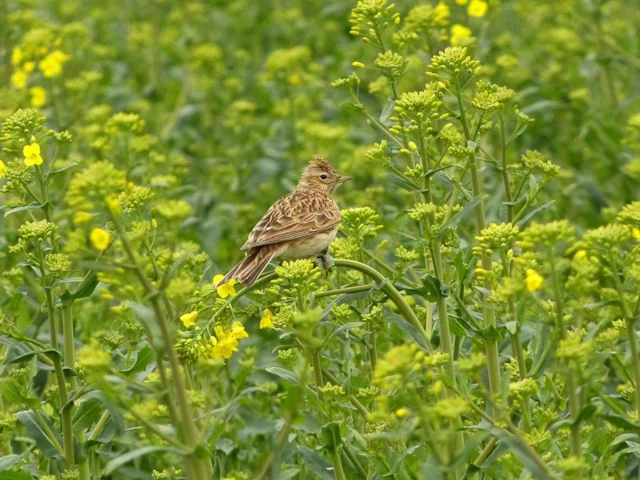Europe fails wildlife again?
261eb4b2-afd6-4daf-b4c6-4aa71e98ec17

The RSPB have launched a broadside against the EU's agricultural policy, which looks likely to radically set back the recent advances in farmland wildlife conservation.
A deal on the next Common Agricultural Policy (CAP), brokered in Brussels last week, signals very rough times ahead for wildlife across Europe. This comes on top of the EU budget deal in February, which cut funding for wildlife-friendly farming schemes.
From the Brown Hare to the Brown Hairstreak, the future of many of our most celebrated species is inextricably linked to how our countryside is managed and the CAP deal will have a massive influence. The RSPB believes that the deal means much of the CAP’s annual €50 billion budget will fail to support wildlife and the environment, pushing more species across Europe to the brink. The State of Nature report – published by 25 conservation and research organisations in the UK last month – showed that 60 per cent of UK species reliant on farmland are declining.
Martin Harper, the RSPB’s Conservation Director, said: "The deal struck today is likely to be disastrous for wildlife and the environment and it is a poor use of precious public funding. The final deal has favoured vested interests and let down many of Europe’s most progressive farmers who have been working hard to make space for nature and the environment while producing food. We are now appealing to Owen Paterson and his counterparts in the other UK countries to use their full powers to reward those who are willing to really deliver the most for wildlife and the environment.
"The Secretary of State was one of the few voices in Brussels calling for a reform which drives up environmental standards across farming and directs the money to the very best. It will now be down to him and his colleagues in the devolved countries to follow through on this. Greening had real potential – the final deal has been emptied of real environmental value."
One of the most high profile aspects of this reform round was the introduction of new environmental requirements attached to direct payments – so-called 'greening.' However, these measures have been drastically watered down by Agriculture Ministers and MEPs on the Agriculture Committee.
Jenna Hegarty, the RSPB’s lead on CAP reform, said: "Greening had real potential to secure much-needed space for nature across Europe’s farmland but the final deal has been emptied of real environmental value. It is hard to see how this reform will help the recovery of the 300 million farmland birds we have lost across Europe since 1980."
The recently-rebranded RSPB is particularly concerned about the shortage of funding available for so-called 'high nature value' farming areas. These farmers, often working in some of the most iconic landscapes in the UK help to preserve threatened species and the landscapes they depend upon.
A deal on the next Common Agricultural Policy (CAP), brokered in Brussels last week, signals very rough times ahead for wildlife across Europe. This comes on top of the EU budget deal in February, which cut funding for wildlife-friendly farming schemes.
From the Brown Hare to the Brown Hairstreak, the future of many of our most celebrated species is inextricably linked to how our countryside is managed and the CAP deal will have a massive influence. The RSPB believes that the deal means much of the CAP’s annual €50 billion budget will fail to support wildlife and the environment, pushing more species across Europe to the brink. The State of Nature report – published by 25 conservation and research organisations in the UK last month – showed that 60 per cent of UK species reliant on farmland are declining.
Martin Harper, the RSPB’s Conservation Director, said: "The deal struck today is likely to be disastrous for wildlife and the environment and it is a poor use of precious public funding. The final deal has favoured vested interests and let down many of Europe’s most progressive farmers who have been working hard to make space for nature and the environment while producing food. We are now appealing to Owen Paterson and his counterparts in the other UK countries to use their full powers to reward those who are willing to really deliver the most for wildlife and the environment.
"The Secretary of State was one of the few voices in Brussels calling for a reform which drives up environmental standards across farming and directs the money to the very best. It will now be down to him and his colleagues in the devolved countries to follow through on this. Greening had real potential – the final deal has been emptied of real environmental value."
One of the most high profile aspects of this reform round was the introduction of new environmental requirements attached to direct payments – so-called 'greening.' However, these measures have been drastically watered down by Agriculture Ministers and MEPs on the Agriculture Committee.
Jenna Hegarty, the RSPB’s lead on CAP reform, said: "Greening had real potential to secure much-needed space for nature across Europe’s farmland but the final deal has been emptied of real environmental value. It is hard to see how this reform will help the recovery of the 300 million farmland birds we have lost across Europe since 1980."
The recently-rebranded RSPB is particularly concerned about the shortage of funding available for so-called 'high nature value' farming areas. These farmers, often working in some of the most iconic landscapes in the UK help to preserve threatened species and the landscapes they depend upon.

